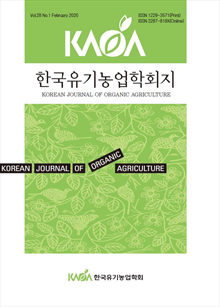간행물
한국유기농업학회지 KCI 등재 Korea Journal of Organic Agriculture

- 발행기관 한국유기농업학회
- 자료유형 학술지
- 간기 계간
- ISSN 1229-3571 (Print)2287-819X (Online)
- 수록기간 1992 ~ 2020
- 주제분류 농수해양 > 농학 농수해양 분류의 다른 간행물
- 십진분류KDC 523DDC 630
권호리스트/논문검색
Vol.28 No.1 (2020년 2월) 5건
1.
2020.02
서비스 종료(열람 제한)
This study argues that expanding the multifunctionality of agriculture (MFA) may mitigate existing agricultural problems. To do that this study redefines the concept and scope of the MFA and presents practical tasks to achieve it. Theorizing the MFA begins with the theory of sustainability and first identifies the link between sustainability and MFA. Later, considering the limitations of the existing sustainability theories, we examined where the false linkages leading to the destruction of environmental and social relations originated, and employed the (Re)productivity [(Re)produktivitat] theory in order to obtain alternatives. Research shows that welfare effects of the MFA on humans and the environment are not less than those derived from the agricultural products supplied to the real market, but the values are not recognized. The absence of proper care and compensation is the basis of agricultural problems in Korea. Therefore, this study acknowledges that the MFA is as much worthy as real agricultural production, and insists that appropriate compensation and care should be given to humans (farmers) and nature (agricultural ecosystem) in order to maintain and expand the MFA. In other words, a virtuous cycle between sustainability and the MFA means that the process spreads sustainable farming methods to expand the MFA, forms social consensus on it, and pays fair remuneration for agriculture from the public sector. Transition to such a virtuous cycle requires re-establishing the definition and scope of the MFA, implementing targeting policy, motivating policy targets, strengthening human capacity, and arranging maturity time.
2.
2020.02
서비스 종료(열람 제한)
Korea-US FTA amendment became effective January 1, 2019 through several trade negotiations between the two countries. These amendments did not include changes in the agricultural sector. However, given the policy direction of the Trump administration, it is difficult to be certain that the existing Korea-US FTA on the agricultural sector will remain unchanged. This study examines the potential impact of changes in the US beef import tariff rates under the Korea-US FTA, which is progressively eliminated until 2026 using a dynamic partial equilibrium model. The modelling system is simulated with 100% decreases of tariff rates over 2020~2026 period and then compared to the baseline which is developed based on the current Korea–US FTA tariff rates. According to the scenario analyses results, 100% decreases of US beef tariff rate lowered Korean beef cattle production value up to 4.23%. Looking at this change in terms of absolute value rather than percentage, the total production value over 2020~2026 is expected to decrease by 815 billion won compared to Baseline. This reduction in production value in dynamic analysis is 67 billion won higher than the comparative static analysis.
3.
2020.02
서비스 종료(열람 제한)
This study analyzed and suggested management situations and improving issues on a consumer cooperatives which has supplied environmentally friendly agricultural products from the year 2002. Indices of management analysis are stability ratio, activity ratio and profitability ratio. Management Stability ratio indices are debt ratio, net worth ratio, fixed ratio and current ratio. Management activity ratio ones include fixed assets turnover and net worth turnover. And profitability ratio is showed through return on investment, net return on sales and return on equity. In order to analyze these indices, financial statements after the closing entires are used each year.
4.
2020.02
서비스 종료(열람 제한)
The paper is to compare two villages in Songak-myeon, Asan, Cnungnam Province in Korea. It tries to show how the joint village project, which began with the support of the same external organization, produces different results depending on the internal conditions and circumstances of the village. From the end of the 1990s, Pyeongchon-ri and Sugok-ri started developing villages under the influence of the environmentally friendly farming movement. And subsequent supports were provided by local organizations for the development of the village. However, the village project in Sugok-ri, which focused on economic performance, later turned out to be a failure, and the residents changed to pursue activities for their own economic interests individually. On the other hand, In Pyeongchon-ri, the cooperation among villagers was strengthened in implementing support projects by similar external agencies. In addition, community ties and identity have been strengthened as problems have been solved through cooperation among residents in the process of promoting the village project. Nevertheless, projects undertaken in Pyeongchon-ri for the purpose of increasing economic performance was all failed. Through these findings, the paper asserts that the neo-endogenous development approach utilizing external support on the basis of internal cooperative network among villagers must be a very useful method for rural development in contemporary societies.
5.
2020.02
서비스 종료(열람 제한)
To develop an environment-friendly fungicide for controlling tomato wilt diseases, antifungal active substance was isolated Rheum australe D. Don roots against Fusarium oxysporum f. sp. lycopersici, a pathogen of tomato wilt, in this study. Methanol extract obtained from Rheum australe roots was successively fractionated with hexane, chloroform, ethyl acetate, butanol and water. The ethyl acetate fraction, which showed the highest antifungal activity, was separated by column chromatography, and 60 subfractions were obtained. The 60 subfractions were anlayzed for antifungal activities by bioassay. The active compound was identified as 5-[(E)-2- (3-hydroxy-4-methoxyphenyl)ethenyl]benzene-1,3-diol (rhapontigenin) by NMR and GC-MS analysis. As a result of testing antifungal activity of rhapontigenin against Fusarium oxysporum, EC50 of rhapontigenin was showed strong antifungal activity at 7.48 mg/L. Therefore, this study showed that the Rheum australe roots extract can be a potential candidate which is a environment-friendly fungicide against Fusarium oxysporum.

